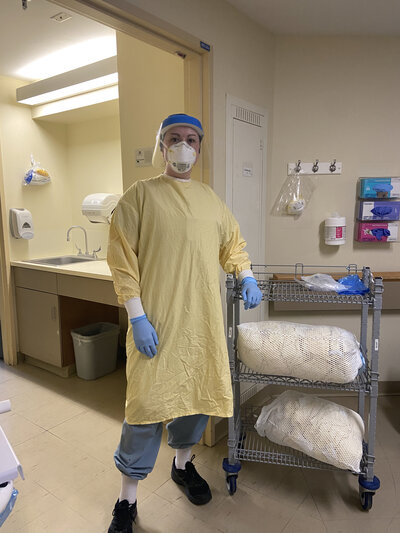
At a time when they’re needed most, 30 Respiratory Therapy students at The Michener Institute of Education at UHN’s School of Applied Health Sciences completed their program and prepared to enter the frontlines of healthcare this past April.
Respiratory Therapists (RTs) are the medical professionals who treat problems with a patient’s lungs or breathing. They play a pivotal role in the care of patients who become critically ill with COVID-19.
Despite the students’ summer simulation semester being delivered primarily online due to COVID restrictions, they were still able to come on-site in small groups for concentrated skills practice that included enhanced infection control practices. Information on the management of COVID patients was also provided, including access to the Michener-built COVID and Critical Care Learning platform.
Starting in September 2020, the students completed their clinical year in its entirety. To allow them to enter the workforce quickly, Michener expedited the review process in order to confirm with the College of Respiratory Therapists of Ontario who was eligible to apply for a graduate certificate of registration.
“Typically, this process is completed in a two-week period after the students finish their clinical year,” says Lori Peppler-Beechey, Chair of Critical Care at Michener. “This year, we completed this in a matter of days.”
For graduating Respiratory Therapy student Eba Basith, completing her clinical year at North York General Hospital during the pandemic has been physically and mentally challenging, but it has also been a great learning opportunity for managing multiple patients during a highly stressful time.
“With what the RTs are dealing with now, especially new graduates, I know we will come out being able to handle any situation thrown at us,” she says.
“I’m not sure that any amount of Respiratory Therapy training can adequately prepare you to work on the frontlines during a pandemic caused by a respiratory virus,” says Alexandra Connolly, who completed her clinical training at St. Michael’s Hospital and now works there, as well as Toronto General Hospital. “However, I do feel that Michener provided me with many opportunities to utilize my theoretical knowledge of Respiratory Therapy in a hands-on environment.”
Eba and Alexandra have also found amazing support in their fellow healthcare workers, especially those who are newer graduates themselves as they have already had the experience of transitioning from being a student to working during the pandemic.
“I see beauty within the Respiratory Therapy and multidisciplinary teams that I am a part of,” Alexandra says. “The solidarity of the healthcare community has been awe-inspiring and continues to motivate me to improve both at work and in my everyday life.”